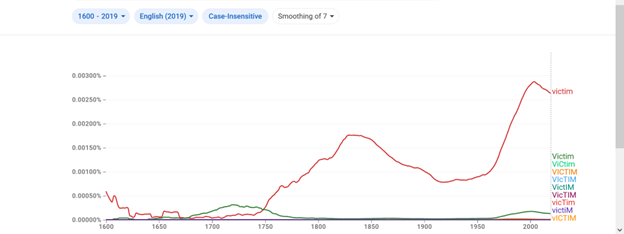The Victim: From Sacred Power to Exploited Weakling

All sacred things must have their place.
It could even be said that being in their place
is what makes them sacred.
— Claude Lévi-Strauss
Most etymologies tend to looks backwards from current usage to the possible origins of a given word.
When looking into the concept of a “victim”, I think we might take another route. My reasoning is to illustrate how our thinking evolved (or devolved, depending on your point of view), and how a thread of a notion can be woven through a collective consciousness spanning eons.
Well prior to the Ancient Greeks and Romans, the people who today we reference linguistically as “Proto-Indo-European” had a root word or concept which they called “wey” or “weyk”. It was a verb, rather than a noun, and meant to separate or to sift. This sifting, choosing, or separating, denoted the act of setting something aside as holy or consecrated, and indirectly the act of a sacrifice.
From there, the concept and word moved in a few other directions. In the Proto-Germanic, it changed slightly to “wikkona”, meaning to practice sorcery. It also evolved from a verb or action into a noun, thing or adjective, “wihaz” which means sacred. These two early words eventually evolved into the English word “witch”. In Proto-Italic (which eventually gave us Latin), the word became the noun “victima”, a far more specific term referring to a sacrificial victim.
In English, we began to use the term “victim” in the 1400s, and it referred exclusively to a sacrificial animal or a living being that would be killed for the benefit of a deity or supernatural entity.
The idea of a singular person or group of persons being “victims” only came about in the mid-1600s. This is where we denote a person who is severely hurt, tortured, or killed by another.
Later, in 1718 the Century Dictionary defined a victim as a “person oppressed by some power or situation, person ruined or greatly injured or made to suffer in the pursuit of an object, or for the gratification of a passion or infatuation, or from disease or disaster”. (Interestingly, the dictionary cites examples pertaining to ambition, rheumatism, and travel accidents.)
In this zeitgeist, it was possible (perhaps commonplace) to become a victim to oneself.
Still later, in 1781, a victim was attributed with “weakness”, where a person was taken advantage of, or cheated, or fooled in some way. The victim was now being victimized by something more often external.
Today victims abound.
Look at an N-gram for the word:

Ignoring the odd case-sensitive entries, the word had a bounce in the mid-1800s, dipping considerably in the 1920s through the 1950s. Then it peaked in 2000.
Granted, an n-gram analyses printed works, and, because of the greater number of printed materials, most commonplace words tend to trend upward as time goes on. Still, the terms “victim” (and “victimhood”) markedly increase from the 1960s through the 2000s. I have no idea why that might be, but I do have a few observations on the “convenience” of victims in today’s world.
Where a victim was once a sacred and separate thing, a creature or act of power, it has now devolved into a tool. A victim, particularly if the victim is dead, can become what others want her or him to be. Anything can be said about him or her — they can’t talk back. They can be used, by anyone, and for anything.
The victim (or victimhood) becomes perversely valuable in this way, almost — but not quite — coming back full circle to the holy, the symbolic, and the silent.
Would you like to read other essays? If so, please click the home page link below:

You, Dear Reader, are much needed and appreciated.
Everything written requires a reader to make it whole. The writer begins, then you, dear reader, take in the idea and its image, and so become the continuation of its breath. Please subscribe so that my words can breathe. Consider this my hand, reaching out to yours.

